
CRM in Financial Services: A Detailed Guide
 Updated on
Updated on
 By Katie Bowman
By Katie Bowman
Katie Bowman
Katie has extensive experience in customer service and enjoys the opportunity to help others. She is committed to providing high-quality service and d...
learn more
Katie Bowman
Katie has extensive experience in customer service and enjoys the opportunity to help others. She is committed to providing high-quality service and d...
Table of Contents
Table of Contents
A reliable customer relationship management system is beneficial and vital in this ever-changing and intensely competitive financial services industry.
Financial professionals must comprehensively grasp their customers' wants and demands to create strong relationships that will bring success for both parties. This is where a financial adviser CRM comes in.
But is it worth the consideration?
Well, a report published by Grand View Research predicts that the worldwide CRM market will reach a substantial $163.16 billion by 2030, growing at an impressive CAGR of 13.9%. But what does this have to do with you?
Okay. This trend is driven by the increasing adoption of digital technologies, the growing demand for personalized services, and the need to improve operational efficiency. With the right CRM system, you can streamline your processes, automate routine tasks, and focus on what matters – building solid relationships with your clients.
In this article, we'll dive deeper into CRM in financial services and explore the following:
- The best CRM in financial services to consider
- What it a CRM in financial services means
- Essential features to look for, and
- Key benefits of using a CRM system
So let's get started!
Key Takeaways
- With the CRM market projected to reach $163.16 billion by 2030, adopting these tools is no longer optional but essential for financial firms aiming to improve operational efficiency and client retention.
- The best financial advisor CRMs offer robust features like automated compliance logging, built-in softphones, and "social-style" activity streams, moving far beyond simple address books.
- Implementing the right software allows practices to grow their client base without increasing administrative overhead while simultaneously ensuring adherence to strict SEC and FINRA regulations through automated audit trails.
- From banking to insurance, CRM software breaks down data silos, providing a 360-degree view of the customer that enables personalized advice, improved lead nurturing, and higher conversion rates.
10 Best CRM for Financial Advisors
For financial professionals, selecting the right software is about more than just contact management. It's about compliance, relationship depth, and efficient workflow automation.
Below is a summary of the top CRM in financial services, ranging from agile solutions for independent advisors to enterprise-grade platforms for corporate finance.
|
Platform |
Best For |
Pricing Details |
|
Lead generation & communication automation |
Starting at $119/month |
|
|
Customization & enterprise scalability |
Starting at $25/user/month |
|
|
Workflow compliance & independent advisors |
Starting at $39/user/month |
|
|
Modern user interface & team collaboration |
Starting at $59/user/month |
|
|
Deep wealth management integrations |
Starting at $69/user/month |
|
|
Portfolio management & reporting |
Contact for pricing |
|
|
Sales intelligence & relationship coaching |
Contact for pricing |
|
|
No-code process automation |
Starting at $25/user/month |
|
|
Banking & insurance operational flows |
Starting at $15/user/month |
|
|
Complex corporate finance & security |
Contact for pricing |
Disclaimer: Pricing accurate as of January 2026 and are subject to change.
1. Ringy - Your Strategic Partner for Efficiency
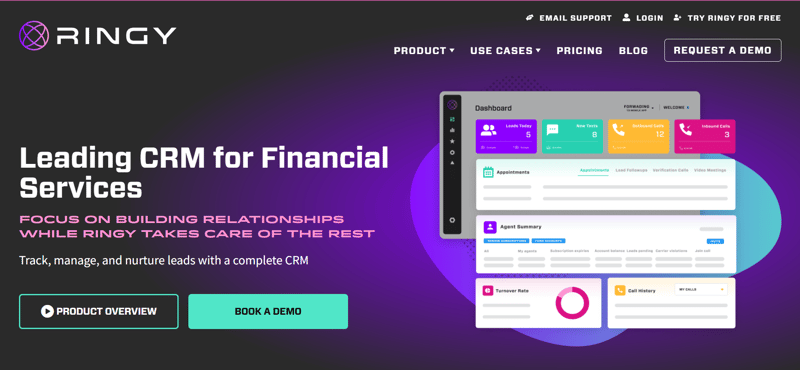
Ringy has rapidly emerged as a top contender for financial advisor CRM software, particularly for advisors who prioritize proactive communication and lead conversion.
Unlike legacy systems that can be clunky, Ringy integrates a powerful softphone and automation suite directly into the dashboard. It bridges the gap between marketing and relationship management, making it an excellent CRM for financial advisors looking to scale their client base efficiently.
Key Features
- Automated SMS and Email Drip Campaigns: Ringy allows advisors to nurture leads automatically with compliant, personalized sequences that ensure no prospect falls through the cracks.
- Built-in Softphone and Calling: The platform includes integrated calling capabilities, allowing agents to make, record, and log calls directly within the CRM for seamless compliance and tracking.
- Lead Distribution and Routing: For firms with multiple advisors, Ringy intelligently routes incoming leads to the available agent, reducing response times and increasing conversion rates.
- Sales Pipeline Management: Advisors can visualize their entire sales funnel, dragging and dropping deals through stages to maintain a clear view of potential revenue and active opportunities.
- Progressive Mobile Application: The mobile app ensures financial service CRM capabilities are available on the go, allowing advisors to manage appointments and respond to clients from anywhere.
Thanks to our intuitive platform, you can easily track client activities in real time, which gives you a leg up on enhancing client relationships.
2. Salesforce

Salesforce remains the heavyweight in the industry, offering the Financial Services Cloud—a dedicated solution designed to handle complex wealth management needs. It is arguably the best CRM for financial advisors who require deep customization and AI-driven insights.
Key Features
- Financial Services Data Model: Salesforce includes a specialized data architecture that tracks households, goals, and life events rather than just individual contacts.
- Einstein AI: The platform utilizes artificial intelligence to predict client needs, scoring leads and suggesting next best actions for advisors.
- AppExchange Ecosystem: Users can integrate thousands of third-party financial apps, making it a highly adaptable finance company software.
3. Redtail Technology
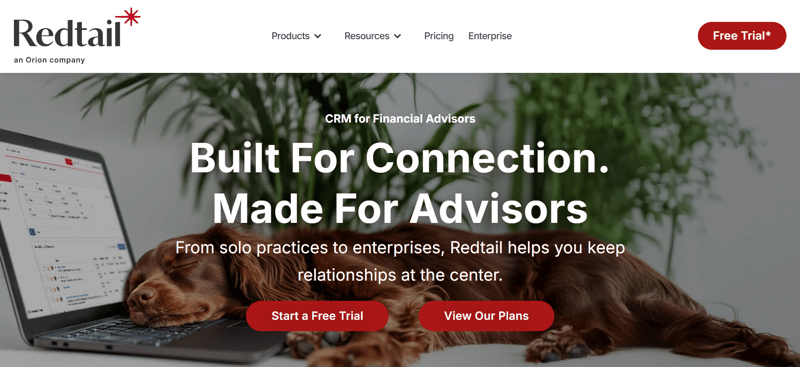
Redtail is a dominant player in the independent broker-dealer space. Known for its user-friendly interface and focus on compliance, it is a staple financial advisor CRM that emphasizes workflow efficiency.
Key Features
- Workflow Automation: Redtail enables advisors to build consistent processes for client onboarding, ensuring every compliance step is documented and completed.
- Redtail Speak: This feature offers compliant text messaging, allowing advisors to communicate with clients via SMS while archiving conversations for regulatory audits.
- Seminar Management: The tool includes specific features for managing client events and seminars, a common marketing strategy for financial advisors.
With Redtail, you'll be able to manage your clients more efficiently and effectively. Their user-friendly interface makes it easy to navigate and customize to your specific needs.
4. Wealthbox
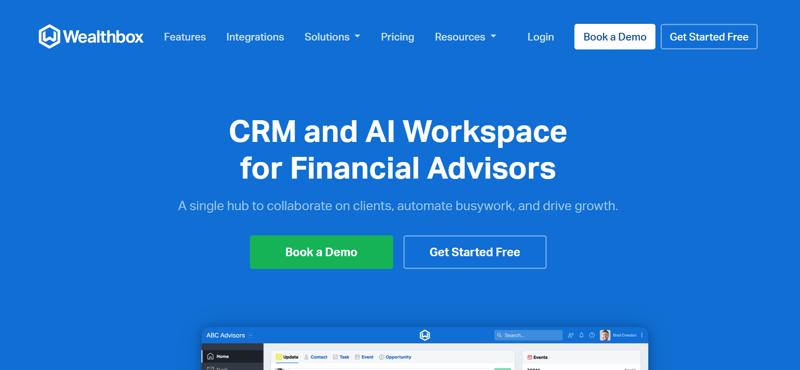
Wealthbox is celebrated for its "social network" style interface, which requires zero training to master. It is often cited as the best financial advisor CRM for modern, agile teams that need to collaborate without the friction of complex enterprise software.
Key Features
- Activity Streams: Similar to social media feeds, this feature allows team members to see real-time updates on client files and internal collaboration notes.
- Click-to-Call Integrations: Wealthbox integrates deeply with VoIP providers, streamlining the communication process for high-volume advisory firms.
- Custodian Integrations: The platform connects seamlessly with major custodians like Schwab and Fidelity to view account data directly within the contact record.
5. AdvisorEngine (Junxure)
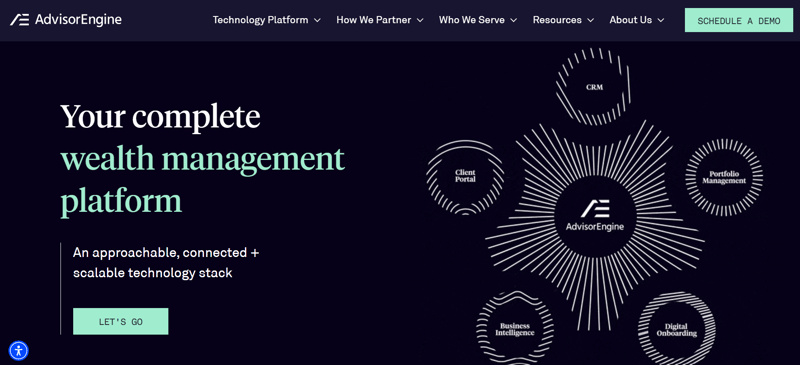
Formerly known as Junxure, AdvisorEngine CRM is built specifically for wealth management firms. It excels in operational data and is a robust CRM software financial advisors use to manage complex client assets and reporting.
Key Features
- Client Reporting Integration: The system offers deep integration with portfolio management tools to provide a holistic view of client assets alongside relationship data.
- Action-Based Workflows: AdvisorEngine utilizes a unique "action" architecture that ensures every task is tracked, assigned, and linked to a client record for full accountability.
- Document Management: It provides robust document storage and management capabilities, critical for maintaining the paper trail required in financial service CRM.
6. Envestnet/Tamarac
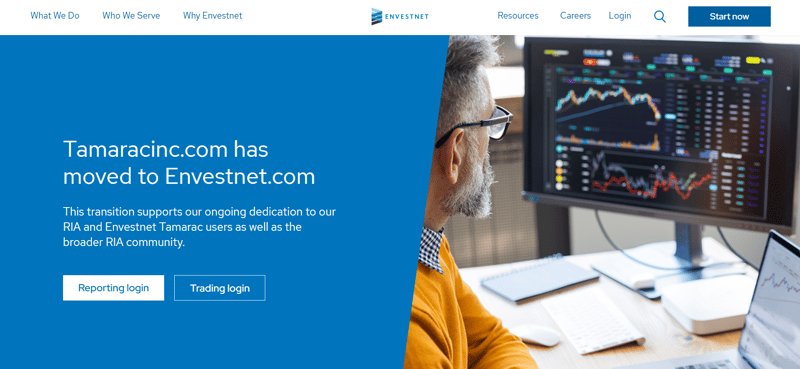
Tamarac is a comprehensive platform where the CRM is part of a larger ecosystem involving trading and reporting. It is a specialized financial adviser CRM often used by larger RIAs (Registered Investment Advisors) who need an all-in-one solution.
Key Features
- Microsoft Outlook Integration: The CRM syncs bi-directionally with Outlook, ensuring that emails and calendar events are automatically captured in the client record.
- Household Management: Tamarac allows advisors to view clients at the household level, aggregating accounts to see the total relationship value.
- Portfolio Rebalancing: While primarily a portfolio feature, the CRM data informs rebalancing decisions, alerting advisors when client portfolios drift from their target allocation.
7. Maximizer
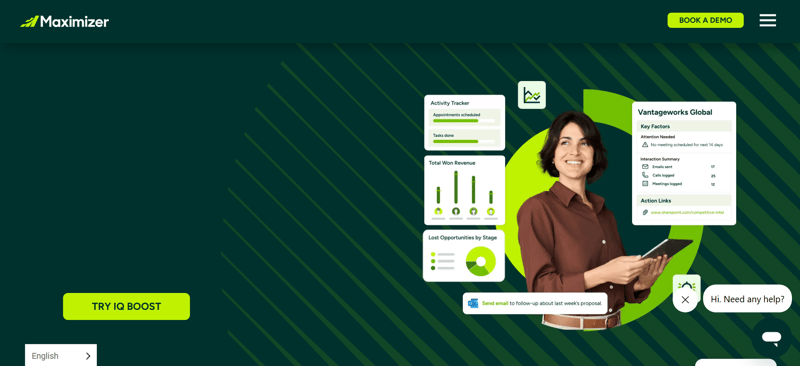
Maximizer offers a flexible solution that can be deployed in the cloud or on-premise, catering to firms with strict data sovereignty requirements. It is a strong software for finance company usage where sales intelligence is a priority.
Key Features
- Sales Intelligence: Maximizer provides built-in coaching tools and performance indicators to help financial sales teams hit their revenue targets.
- Audit Trails: The software offers rigorous logging of user activity, which is essential for meeting the strict regulatory standards of the financial sector.
- Customer Service Module: Beyond sales, it includes a dedicated service module to manage support tickets and client inquiries efficiently.
8. Creatio CRM

Creatio distinguishes itself with a low-code/no-code architecture, allowing financial institutions to build custom workflows without hiring developers. It is a flexible best CRM financial advisors can use if they have unique process requirements.
Key Features
- No-Code Customization: Financial firms can modify the interface and data fields easily to match their specific niche, such as lending or wealth management.
- Unified Front Office: Creatio connects marketing, sales, and service into a single platform, eliminating data silos that often plague financial institutions.
- Business Process Management (BPM): The platform is built on a BPM engine, allowing for the automation of complex, multi-stage financial approvals.
9. BUSINESSNEXT
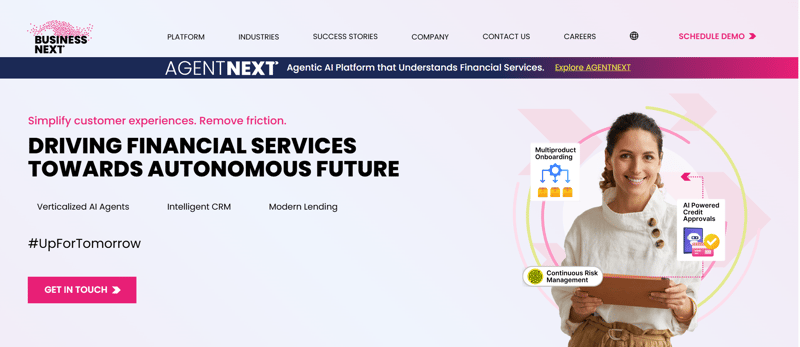
BUSINESSNEXT is a specialized platform often used by banks and credit unions. It focuses on the "universal banker" concept, making it a powerful CRM for corporate finance and retail banking operations.
Key Features
- AI-Driven Lead Engagement: The platform uses algorithmic scoring to identify high-value cross-sell opportunities within the existing client base.
- Digital Onboarding: BUSINESSNEXT streamlines the KYC (Know Your Customer) and account opening process, significantly reducing the time to onboard new financial clients.
- Service Query Resolution: It includes automated service flows that help support teams resolve standard banking queries faster.
10. Oracle CX
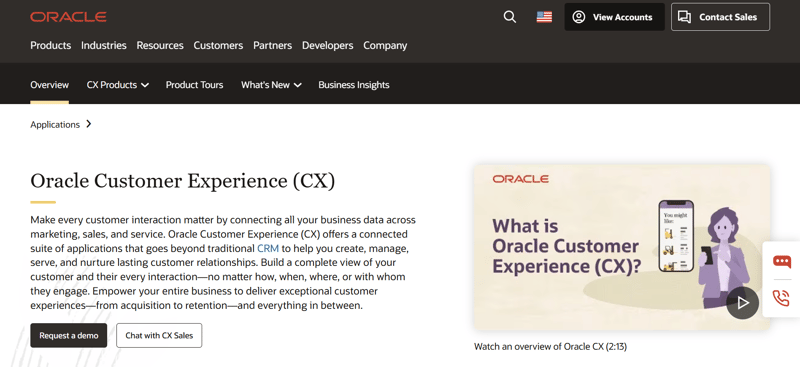
Oracle CX for Financial Services is an enterprise-grade solution designed for large institutions. It is arguably the best CRM for financial advisor teams working within massive corporate environments requiring high-level security and data processing power.
Key Features
- Predictive Intelligence: Oracle leverages vast data sets to provide predictive insights on client churn and lifetime value.
- High-Security Infrastructure: As a CRM financial advisor tool for enterprises, it offers some of the most advanced data encryption and access controls in the market.
- Corporate Banking Modules: The software includes specific modules tailored for corporate finance, commercial lending, and deal management.
What Is a Financial Advisor CRM?
A financial adviser CRM, also known as a customer relationship management system for financial services, is a software tool used by financial advisors to manage client relationships, track interactions, and automate administrative tasks.
It enables financial advisors to store and access essential client data in one central location, allowing them to provide personalized advice and build strong relationships with clients.
A good financial adviser CRM can:
- Streamline the client onboarding process,
- Help manage appointments and follow-ups, and
- Provide insights into client behaviors and preferences.
With the right CRM, financial advisors can focus on what they do best - providing sound advice and helping clients achieve their financial goals.
CRM Financial Advisor’s Role in Businesses

To ensure your financial services business thrives, it is critical to understand the distinct functions a CRM system can serve in various departments. That's why we analyzed precisely how a CRM performs its duties across multiple divisions inside your financial advisor business.
1. Sales Management
Sales management plays a vital role in any financial advisor’s business. With the help of a CRM system, sales managers can keep a close eye on the sales funnel and optimize it for better performance. They can track leads and prospects and analyze data to improve the sales process.
You can pinpoint which marketing channels generate the most qualified leads by utilizing sophisticated tracking. Additionally, you can measure your conversion rates and determine where to optimize to improve sales funnel performance.
2. Sales Representatives
Sales reps are the frontline of any financial advisor’s business. Hence, they need the right tools and information to close deals. A CRM system can help your reps manage their leads and schedule appointments.
It can also give them a 360-degree view of their prospects, including their preferences and history with the company.
HubSpot's study found that companies who utilize CRM can increase their sales productivity by up to 29%. This is because CRM has automated processes, such as sending follow-up emails and reminders.
By doing this, sales reps have more time to build meaningful connections with prospects while providing them with the best solutions for their financial needs.
3. Financial Advisors
To give your clients the best advice and assistance, you'll need to thoroughly understand each client's finances and ambitions.
To make this easier, CRM systems can provide you and your team with tools such as account tracking capabilities and performance dashboard visuals - helping you stay organized to offer up-to-date counsel on investments.
But how exactly can you leverage a financial adviser CRM to improve your business performance?
By leveraging the power of CRM data, you can provide your clients with tailored investment advice. Furthermore, you can strengthen client relationships and boost engagement by monitoring and responding to their communication preferences accordingly.
4. Sales Managers
Sales managers are essential for a sales team's success, and it is their responsibility to track performance and determine how they can advance. This task can be made easier with an effective CRM system that keeps tabs on each sale within the pipeline while providing data-driven insights to aid in important decisions.
Let's say a sales manager wants to identify the areas of low performance in the team. By leveraging reporting tools within a CRM system, they can pinpoint which rep is falling behind, what customers are being neglected, and how much time is wasted on unnecessary tasks.
This data-driven approach helps managers drive better sales performance from their reps while setting the foundation for more efficient processes.
Features to Look For in a Financial Advisor's CRM

When selecting the right CRM for financial advisors, there are a few key features to consider.
1. Automated Workflows
Who wants to spend hours doing manual data entry and repetitive tasks? Not you, we're sure. That's where automated workflows come in handy. Using a CRM with this feature, you can create a series of actions that happen automatically based on triggers you set.
For instance, you can establish a streamlined process that automatically sends out a welcome email to each new client added to your system, enroll them in your newsletter list, and assign tasks for team members to follow up with the customer.
Voila! You just saved yourself a bunch of time and ensured that your new client gets a personalized welcome.
Statistics show that businesses that use automated workflows see a 15% increase in productivity and a 12% reduction in costs. That's something to smile about, right?
2. Collaboration Capabilities
Are you a one-person show, or do you have a team of financial advisors working with you? Either way, you need a CRM that allows for collaboration. This means that you and your team members can access the same client data and work together seamlessly.
For instance, when a client asks you a question while you're away from the office, your staff can quickly get their records and get back to them as soon as possible - no waiting is necessary.
Collaboration capabilities also mean you can assign tasks to team members and track their progress. This ensures that nothing falls through the cracks and that everyone is on the same page. Plus, it makes for a happier and more productive team.
3. In-Built Texting & Calling
We live in a world where people are attached to their phones, so it makes sense to have a CRM that allows texting and calling from within the system.
By utilizing this tool, you can call or text a customer directly from your computer instantly. Additionally, all communication with them is documented and stored in their file for any compliance needs. This way, you can save time without using another device or app!
Did you know that texting has a 98% open rate and a 45% response rate? That's much higher than email or phone calls. So, if you're not already using texting to communicate with clients, it's time to start.
4. Marketing & Sales Automation
Investing in a CRM with marketing and sales automation capabilities will be key if you want to expand your business. This way, you can create compelling drip email campaigns, gain insights from website visitors' behavior, and score leads based on their level of engagement with your content.
Additionally, automating the sales process through triggers will help move each lead further down the funnel. For instance, when a lead opens an email or visits a website page, they can be immediately transitioned from cold to warm leads.
Studies show that businesses that use marketing automation see a 14.5% increase in sales productivity and a 12.2% reduction in marketing overhead. That's a win-win in our book.
5. Lead Management
Lastly, it would be best to have a CRM with robust lead management capabilities. This way, collecting leads from your website or other sources is easy. Moreover, tracking their engagement and taking them through the sales funnel will be more straightforward.
You can also segment your leads according to their interests and behaviors, thus enabling more precise and customized communication.
Are you aware that 79% of leads never become customers? It's true, and most often, it is due to a lack of proper lead nurturing.
That's a lot of missed opportunities. But using a CRM with effective lead management tools helps ensure that you nurture and convert your leads efficiently. This can make a huge difference to your bottom line!
Benefits of Financial Advisor CRM Software

Investing in financial advisor CRM software is smart if you want to grow your business. In addition to having the capabilities we discussed above, here are some of the other benefits of using such a platform:
|
Benefit |
Description |
|
Streamline Operations & Efficiency |
Automates routine tasks like appointment planning and file management, freeing up staff to focus on building meaningful client connections. |
|
Reduce Manual Work & Errors |
Minimizes human error through automated data entry and centralized information, significantly boosting sales productivity and forecast accuracy. |
|
Enhance Customer Experience |
Uses data analytics to understand client habits and financial goals, enabling advisors to offer highly personalized recommendations. |
|
Improve Regulatory Compliance |
Centralizes customer data and activity logs to ensure adherence to strict industry regulations like GDPR and facilitate easy auditing. |
|
Track Marketing ROI |
Monitors campaign performance and lead sources, allowing firms to calculate return on investment and optimize marketing spend. |
|
Comprehensive Customer View |
Provides a complete history of client interactions and financial goal shifts, helping advisors anticipate future needs proactively. |
|
Improved Lead Management |
Visualizes prospects in a structured pipeline with custom labels, ensuring high-value opportunities are prioritized and never lost. |
|
Scalability |
Handles increased administrative loads automatically, allowing firms to grow their client base without a corresponding increase in overhead costs. |
1. Streamline Operations and Increase Efficiency
Automating time-consuming tasks such as data entry, file management, and appointment planning enables your employees to spend valuable time on more critical aspects of the business, like forging meaningful connections with customers.
For example, having a CRM system can be an immense help to your financial advisory firm, which is responsible for handling the investments of multiple clients. Without it, keeping track of all the relevant documents and data can strain your team.
Fortunately, when you utilize a CRM system, you can create one centralized place where all critical information is readily available to everyone in your organization!
2. Reduce Manual Work and Eliminate Errors
Not only does a CRM system simplify processes, but it also aids in reducing manual labor and eliminating mistakes. Automating data entry decreases the opportunity for human error and allows your staff to give superior customer service by concentrating on more meaningful tasks.
According to Webinar Care research, businesses that use a CRM platform can expect an average boost of 29% in sales, a 34% improvement in sales productivity, and 42% better forecast accuracy. Now that's what we call a return on investment!
3. Enhance Customer Experience by Providing Personalized Services
Analyzing the data obtained through your CRM system enables staff members to quickly grasp your customers' financial objectives, preferences, and habits. This can create a better customer experience, leading to more loyalty, satisfaction, and referrals.
Say a client reaches out to your firm for details related to retirement planning. With the proper CRM system, your sales rep can easily find their financial background, investment portfolio, and other pertinent information!
Armed with this information, they can provide personalized recommendations tailored to the client's unique needs.
4. Improve Compliance With Regulations:
The financial sector is heavily regulated, and using a CRM platform helps you comply with all the necessary regulations, such as GDPR.
Apart from that, having access to your customer data in one place can make tracking their activities and behaviors easier. This also allows you to detect any suspicious activity quickly, which is essential for maintaining the highest standards of compliance.
5. Track Marketing Efforts and Measure ROI
Achieving business success requires effective marketing, and a CRM system can help you do that.
With it, you have the power to monitor your marketing strategies as well as calculate ROI. You get insight into which campaigns generate the most leads and take note of the channels with superior performance so more prospects will close deals with you!
6. Create a Comprehensive View of Customers' Financial Journeys
With the help of a CRM, you can gain a complete overview of your client's financial journeys. From tracking their interactions with your firm to seeing how their investment goals and objectives have shifted over time – this crucial tool will provide invaluable insight.
Plus, you can offer more personalized services that exceed expectations by staying ahead of their future needs and demands.
There's a wealth of benefits associated with using a CRM system in the financial sector, and it's essential to leverage it for optimal success.
7. Improved Lead Management
For any growing firm, losing track of a prospect is a costly error. The best CRM for financial advisor use solves this by providing granular control over the sales pipeline. Advisors can apply custom labels to leads, such as "High Net Worth," "Retirement Planning," or "Estate Trust," to categorize prospects instantly.
By visualizing these leads within a structured sales pipeline, you know exactly where every potential client sits in the funnel. This clarity transforms a chaotic list of names into a strategic roadmap, ensuring that high-value opportunities are prioritized and nurtured systematically using your financial service CRM.
8. Scalability
Growth often brings growing pains, primarily in the form of administrative burden. A robust CRM for financial advisors acts as a force multiplier, allowing a practice to scale without a corresponding increase in overhead.
By automating data entry, appointment scheduling, and compliance logging, the software absorbs the administrative weight that usually slows teams down. This means a finance company software solution enables your firm to service double the client base without needing to double your support staff, preserving margins while expanding your market reach.
FAQs
How Does a CRM Help With Financial Compliance?
A robust financial advisor CRM software is your first line of defense in a regulated industry. It automatically logs every client interaction, calls, emails, and texts, creating an immutable audit trail that satisfies auditors.
Beyond logging, the best CRM for financial advisor use includes built-in workflows for KYC (Know Your Customer) and AML (Anti-Money Laundering) checks. These features ensure that no mandatory step is skipped during client onboarding, keeping your firm aligned with SEC and FINRA regulations without manual administrative oversight.
Which CRM Does JP Morgan Use?
JP Morgan Chase is widely known to utilize Salesforce as a core part of its technology stack, specifically leveraging the Financial Services Cloud to manage vast client data.
However, like many banking giants, they also rely heavily on proprietary, custom-built CRM for corporate finance systems designed to handle high-frequency trading data and complex security needs that off-the-shelf software cannot fully address. This hybrid approach allows them to combine the flexibility of a commercial CRM with the specialized power of internal tools.
What is the Role of CRM in Banking?
In the banking sector, CRM in financial services acts as the central nervous system for customer experience. Its primary role is to break down silos between departments, loans, checking, and investment advisory, providing a "360-degree view" of the customer.
This unified data allows banks to personalize service, identifying exactly when a customer might need a mortgage or wealth management advice. Ultimately, financial service CRM tools transform banks from transactional record-keepers into proactive financial partners, driving higher retention and lifetime value.
Who Uses a Financial CRM Services Software?
While "CRM" often implies sales, finance company software is used across the entire industry spectrum:
- Banks & Credit Unions: To unify retail banking data and identify cross-sell opportunities (e.g., offering credit cards to checking account holders).
- Wealth & Asset Managers: To manage high-net-worth relationships and complex portfolio reporting using financial advisors CRM tools.
- Insurance Companies: To track policy renewals, claims history, and agent performance.
- Financial Advisors: Independent professionals use financial adviser CRM solutions to automate appointment scheduling, track prospect pipelines, and maintain personal relationships at scale.
Conclusion
Indeed, your customer relationship management can be the difference between success and failure in the financial sector. Therefore, it's essential to choose a CRM system that meets your needs – one like Ringy!
Our cloud-based platform is designed to help financial advisors manage client relationships effectively. With its enhanced tracking capabilities, you can stay ahead of the competition and provide clients with an unmatched customer experience.
Ready to streamline your operations and improve your sales productivity? Try Ringy today and make your financial services firm a success!

Skyrocket your sales with the CRM that does it all.
Calling? Check. SMS? Check. Automation and AI? Check. Effortlessly keep in touch with your customers and boost your revenue without limits.

Take your sales to new heights with Ringy.
Sales in a slump? Ringy gives you the tools and flexibility you need to capture leads, engage with them, and turn them into customers.
Subscribe to Our Blog
Enter your email to get the latest updates sent straight to your inbox!
Categories
Related Articles




































































































